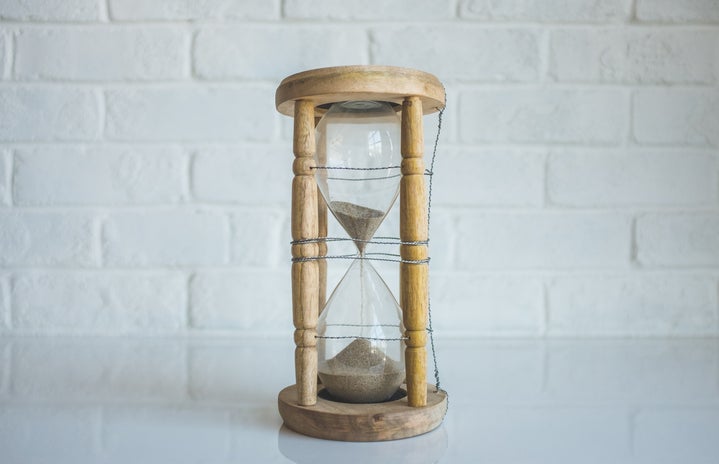We sat down with Emmanuel’s newest Communications professor, and brand new dad, Mark Flynn, to discuss life, politics, and the importance of good communication. Read on to learn more!
Makenzie (Kenzie) Moore: Hi Professor Flynn! I just wanted to thank you again for agreeing to meet with me for this interview Like I said, this is a one of a kind conversation for Her Campus Emmanuel and we are SO very excited to have the opportunity to sit down and talk about subjects that we don’t usually get to discuss during our profiles! So why don’t we jump right in-Tell me a little about where you grew up!
Mark Flynn: Well, I actually grew up not too far away from here, I’m from West Springfield Mass. I went to Roger Williams for my undergrad degree in Bristol Rhode Island, my first trip out of the Bay State, I really enjoyed that experience! Then I went to URI for my Master’s degree, also in Communications. My undergrad had more of a focus in Public Relations and my Masters Degree had a Media focus. Then I went out to Bowling Green, Ohio for my PHD at Bowling Green State and it was a great experience. It’s a little school with a little over 26,000 students…
KM: Ah, so a little bit bigger than our school.
MF: Yeah, just a little bit [laughing]. I actually had committed to them without having been there before, so I just kind of packed up the car, hopped on the motorcycle, dog and all, and rolled into Ohio and it was absolutely amazing. I had no idea what the midwest had to offer for the college experience but it was really amazing how we were all able to just really coexist. It was very community focused.
KM: That’s so great! So, why don’t you tell me a little bit about some of your prior work experience and your publications, I want to know all about that!
MF: Oh wow okay, well, most of my research focuses on health communications very broadly speaking, and media psychology. So I like to study the impact media has on our health, attitudes, perceptions, and behaviors…Mostly, how media impacts our body image and how it really is a public health concern, and that’s what I believe. I’ve looked at reality TV stars and analyzed objectification there, I’ve looked at objectification through music lyrics and perception, as well as risk behavior like drinking, drug use, and sexual behavior. And most of my research focuses on content that younger audiences are consuming more than other age groups, mostly audiences that are still in the process of solidifying their identity, and I believe that media can play a large role in helping to shift their self perceptions.
KM: And how about some of your publications?
MF: One of my more recent publications is in the social media context, I’m fascinated by the idea of exposure to peer norms, particularly about body image through social media. So, [I looked at] the pictures and the comments that are reinforcing the sort of body image we’re seeing in society, and how peer to peer social media interaction can magnify that and in some cases lead to negative consequences. You know, there’s some fascinating research now on things like facebook or social media addiction and how that can be problematic, but I think there’s another layer that’s not just about how we’re constantly on social media, but what exactly we’re exposing ourselves to. It isn’t just actors and actresses anymore, now we’re seeing our peers as the ultimate and sometimes unrealistic versions of themselves, and what that does to our self worth and social comparison.
KM: Wow that is so interesting! Well why don’t we take a minute here to sort of get out of the deep conversation and discuss something a bit more light… Tell me about your daughter Rory! I’m sure having just moved to a brand new place with a new job and starting a family has been somewhat of a whirlwind, so let us know how it’s going!
MF: Oh wow, so yeah, it definitely was interesting. You know, if you had told me a year ago that I would be doing this kind of stuff all at once I’d tell you you were crazy. But now, having actually done it, it’s absolutely amazing. I certainly couldn’t have done it without the support of my wife Layne, she truly holds our household together! And, you know, these are all positive changes. Being at Emmanuel is terrific, you know the students are great and [my] colleagues are amazing. I, on a regular bases, leave the classroom feeling fulfilled which really helps so much with how hard it is having a newborn and being in a new city. But Rory, she is so great, and being a new dad is terrifying, it’s exciting, rewarding, it really is a flood of emotion. She has started “social smiling”, so she will deliberately smile rather than arbitrarily smiling…
KM: Wow, your nerd is totally showing, I love it!
MF: [Laughing] Yeah I’ve definitely done my research. But it’s so great because you can hold her now and it’ll be, you know, two or three in the morning and I’m just exhausted, but she stares right at me and gives me the biggest smile, and it really makes everything okay! It helps you, it helps you a lot. Whether they know it or not they have found ways to manipulate you in the best of ways, and she really is amazing. She has even started mimicking me, so I like to stick my tongue out at her, and she’ll stick her tongue back out at me and it’s like her favorite thing! And now whenever she see’s me she sticks her tongue out at me, and waits for me to do it, and then she just cracks up!
KM: Oh my goodness, at two months! That’s adorable! Well, I guess it’s time to get back to something a little more serious… So tell me, as the father of a newborn daughter, what is your opinion on our new president elect? Does it make you a little nervous knowing that the decisions he might make could determine the kind of America Rory will be growing up in?
MF: Well, um, this is a good question. What I’ll say is, I honestly think that the fact that you have someone who was elected president who is clearly degrading towards women and minorities of other cultures, who is so close-minded, there is a fear that those ideals can spread. And just the idea that he could represent where we stand on social justice is a little upsetting. However, I am an optimist! I think one of the lessons that I learned very early in life, from my mother, is you need to look for the learning experience in difficult time. So with that in mind, this is a teachable moment in a lot of ways, and I want to give the country more credit than what we have seen here in our elected official. I could potentially see a boomerang effect in where we are in social justice. You know, the people who care passionately for equality, equity, the rights of misrepresented minorities, I could see those people being more intent than ever at raising the awareness of these issues at the national stage. For those who are members of those groups who feel nervous of what’s to come, I would say, there are a lot of people who are going to fight for them especially. As for my daughter, obviously it is a bit too early to have these deep conversations, but if you look at research on social psychology, it shows that the parent/child relationship is the most important in solidifying attitudes, values, morals, ethics, early on. It’s my job to lay down the groundwork for her to solidify those values.
KM: Absolutely. It’s tough, and we all know that. Well hopefully we won’t be seeing any sort of restriction coming from our current president elect or our any president elect in the future. It’s just something that my generation is forced to think about, you know, what are we going to tell our kids about this, how will we be able to explain this situation to them? So, how do you feel your role as an educator helps to shape the opinions of our generation?
MF: Well that’s a great question, but before I get at that, let me just add that a lot of our county voted to elect Donald Trump, and I think that while it is important not to continue marginalizing specific groups, it’s also important to take a better look at the issues that were important to the folks who did vote for him, and not alienate them. I would want them to feel respected, and that their opinions are valued overall. Especially if they were in a classroom setting.
KM: Exactly, it is way more complicated than just “Donald Trump is bad and everyone who voted for him is hateful”, and it is so important to realize that there’s more to it. Especially when considering maybe the economic position of those who voted for him, maybe they see him as a way out of whatever situation they’re in.
MF: Yeah exactly, now to move on to the question you’d asked before, I’d say it’s instructive to consider the attitudes and opinions that people hold about politics, specifically about these two candidates that tip the scales one way or another, and how did they form. That’s something I’ve been really fascinated in with my education and with my research, how do we form opinions, attitudes, and beliefs, and what role did media play in solidifying and reinforcing those attitudes and opinions. So as an educator, especially a media scholar, my role is first and foremost, Media Literacy. My job is to help my students to be critical viewers and consumers, and hopefully participants in media, and laying that groundwork is essential. It’s also important to be able to have good conversations about this stuff. When you have these concepts of trigger warnings and safe spaces, I would say that, with respect at the forefront, conversations are so useful. And what I’ve learned this through hearing the conversations my students have, hearing their perspectives and opinions, and, even if you don’t agree with them, to be exposed to them is a crucial part of educating.
KM: Absolutely, and the reason why I wanted to discuss the concept of safe spaces with you is because older generations have such a negative reaction to these concepts because they believe that our generation simply isn’t doing enough. So tell me a bit more about the concept of having a proper space for mediating communication, and how you feel our generation benefits from it.
MF: Yeah, so, it’s important to have these conversations especially with those who have a difficult time speaking out about certain subjects, because we want to make sure their opinions are being heard and our students feel valued. Through my experience in these contexts, it’s had a tremendous effect not just on them but on myself. I’ll give you an example: in my very first publication I looked at a stigmatized issue that people are reluctant to talk about, and my focus was in men’s health. This study in particular looked at male eating disorders. This project looked at an online eating disorder forum for men specifically, and we analyzed the comments to see how men are talking about this. What kinds of things are they saying, because it’s rare for them to talk about it in person. So we found through the anonymous forum that, interestingly, men were engaging in a tremendous amount of emotional support, of emotional disclosure, and when you analyze even other online forums, it tends to be information first, emotion second. In this case it was reversed, men were outpouring this emotion because there was no other space for them to do it in person. So even in that context, this was sort of an online safe space for these men. Their anonymity made it safe. It’s a shame that it’s needed, but we can translate this situation to any group that feels stigmatized or marginalized. Research shows that we need this sort of emotional support, it’s part of how we function as human beings, knowing that we’re not alone. We crave that sort of belonging.
KM: Wow, thank you so much, you’re absolutely right, and I personally don’t think we get to see enough of male’s perspectives on such emotional topics such as this, so I will definitely be promoting your publication because it sounds so important! And, I guess my last question for you today is going to be, what advice do you have on proper communication because it’s so important!
MF: Well, I guess the best bit of advice I could give to you about being a proper communicator, is being a good listener. It is the most important part of being a good communicator. It’s not just about having the ability to go through the proper listening cues and responses, but actually digesting what the other person is saying. It will open up doors of understanding, it will help contextualize issues, relationships, feelings, it will make you a more interesting and dynamic person! People love a good listener, there’s no way around it. Research shows that people who are good at it tend to have really successful friendships and romantic relationships. Related to that, having the perspective of “what is this other person thinking or feeling right now”, and keeping that in mind when communicating with them. You know, I think so often when we will just fall back on stereotypes of whether this person belongs to this specific group, be it different gender or race, or college student versus professor, and we go into those roles, and we sort of interact through those lenses. We need to recognize that everyone is different, and just because they’re part of a certain group doesn’t necessarily mean that they are going to act in the way that you’re expecting them to. So those two very related things are what I believe come first and foremost in making good communicators.
Some more practical advice I have for students would be writing and speaking! Do those to things as often as possible, be comfortable speaking and getting your thoughts down on paper. What I tell students every time they need to give a speech, or even answer a question in class, take that all as practice. This is all practice for when you graduate and when you’re expected to do it, and do it well. So, practice, and view the classroom as practice even. Get in the mind set where you can speak successfully, so you’ll have the ability to do so when it really counts. And for those who have trouble with that, my door is always open for anyone looking for their public speaking tips.
KM: Awesome! Well thank you so much for giving me the opportunity to sit down and get to know you better! You have been amazing, and I can’t wait for our campus to get to know you better! It was an absolute pleasure.
For anyone who is interested in getting to know more about Mark Flynn, like he said, his door is always open! And for those of you who are more interested in some of his publications, they are going to be linked down below!


